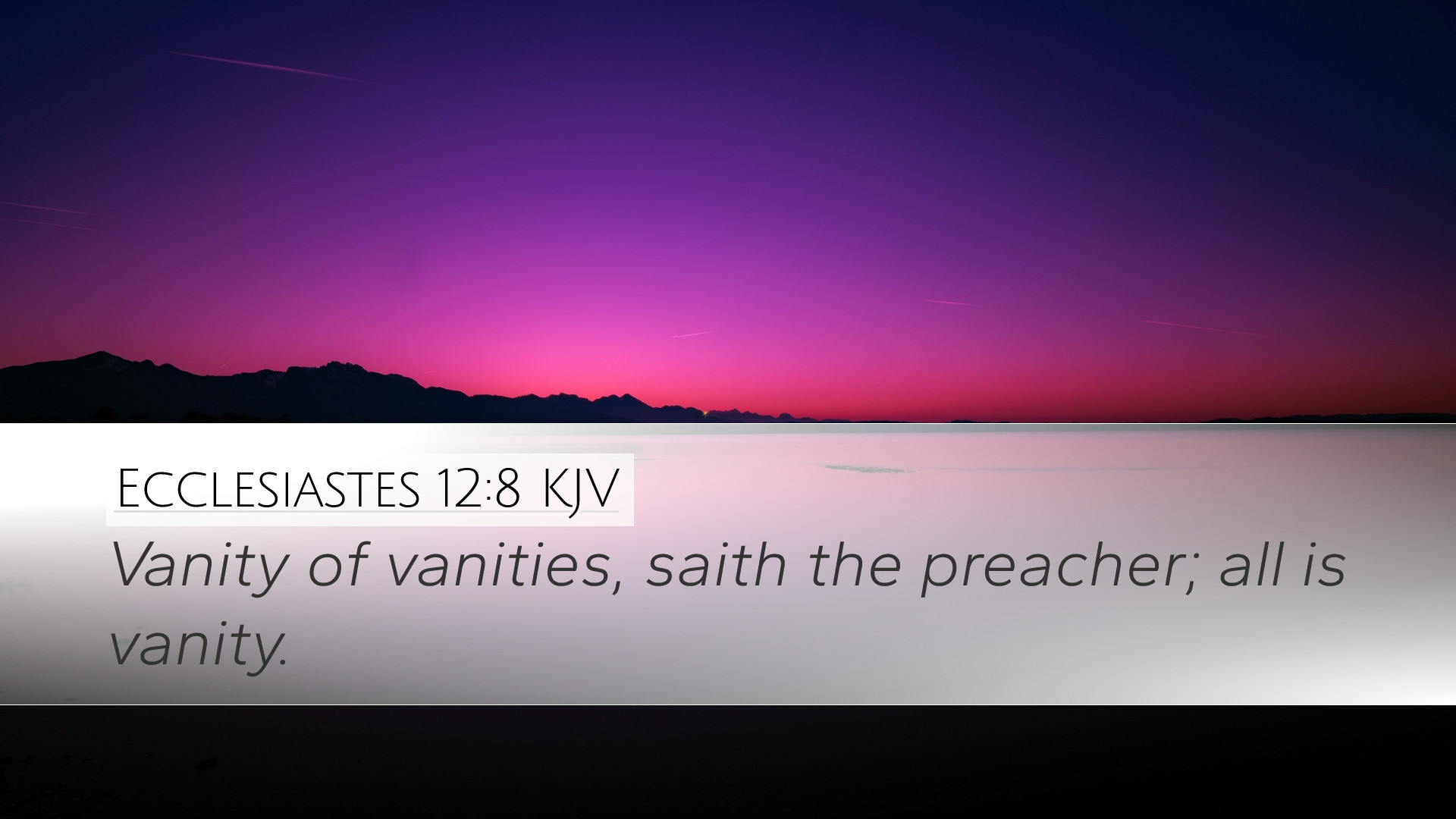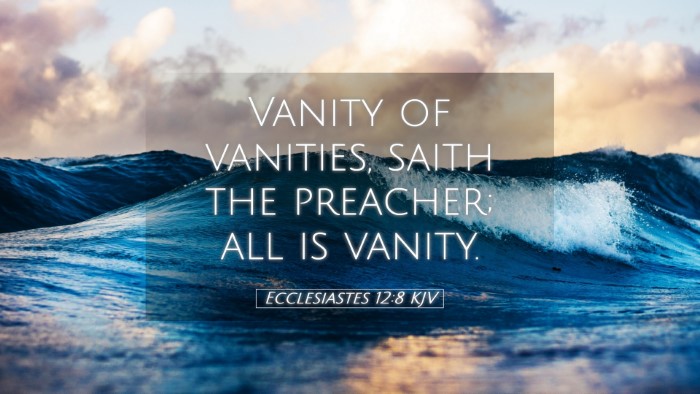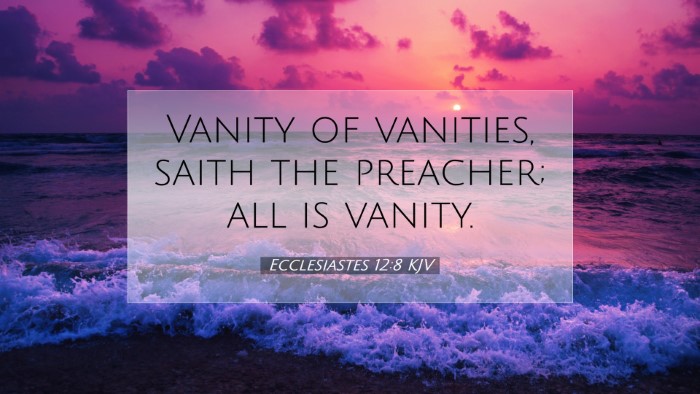Old Testament
Genesis Exodus Leviticus Numbers Deuteronomy Joshua Judges Ruth 1 Samuel 2 Samuel 1 Kings 2 Kings 1 Chronicles 2 Chronicles Ezra Nehemiah Esther Job Psalms Proverbs Ecclesiastes Song of Solomon Isaiah Jeremiah Lamentations Ezekiel Daniel Hosea Joel Amos Obadiah Jonah Micah Nahum Habakkuk Zephaniah Haggai Zechariah MalachiEcclesiastes 12:8
Ecclesiastes 12:8 KJV
Vanity of vanities, saith the preacher; all is vanity.
Ecclesiastes 12:8 Bible Commentary
Commentary on Ecclesiastes 12:8
Ecclesiastes 12:8: "Vanity of vanities, saith the preacher; all is vanity."
Introduction
The closing chapter of Ecclesiastes reiterates the fundamental theme of the book: the pointlessness of earthly pursuits apart from God. In his final reflection, the preacher concludes with the proclamation that all is vanity—a sentiment that resonates deeply with the human experience of searching for meaning in a fleeting world. This commentary integrates insights from various public domain works, providing a comprehensive understanding of this verse for pastors, students, theologians, and scholars.
Historical Context
The author, traditionally believed to be King Solomon, pens these words at the end of a reflective journey through life's ephemeral nature. Throughout Ecclesiastes, he chronicles his attempts to find satisfaction in wisdom, pleasure, and labor, ultimately discerning that these pursuits lack enduring value. This context is critical for understanding the weight of his final admonition.
The Nature of "Vanity"
Meaning of Vanity: The term "vanity" (Hebrew “hevel”) signifies something fleeting, temporary, or insubstantial. It evokes the idea of a vapor or mist, something that cannot be grasped or held. Matthew Henry emphasizes that this term captures the essence of life under the sun—its experiences are transitory and often unsatisfactory.
All is Vanity: In declaring that "all is vanity," the preacher encapsulates the futility of earthly endeavors. Albert Barnes notes that this encompassing statement reminds us that, without a higher purpose or divine context, life itself becomes meaningless. Every pleasure, achievement, or gain falls short of lasting significance when viewed apart from God.
The Preacher’s Reflection
Throughout Ecclesiastes, the preacher’s journey is marked by a relentless pursuit of understanding. Adam Clarke points out that by the time he reaches 12:8, he reflects on the accumulated wisdom of his experiences. He appears to express a weariness with the endless cycles of life, affirming that all pursuits—wisdom, wealth, and pleasure—lead back to the same conclusion: ephemeral satisfaction.
The Interplay of Wisdom and Vanity
In earlier chapters, the preacher elaborates on the value and pursuit of wisdom, yet ultimately aligns it with vanity in this verse. As Henry remarks, wisdom is not without its own frustrations; it too grapples with the same ultimate fate as other pursuits. This constant repetition of the theme serves to underline the uniqueness of a life anchored in divine purpose.
The Conclusion of the Matter
As the book reaches its climactic conclusion, the preacher summarizes life’s lessons. Theologically, this verse invites readers to consider what lies beyond mere earthly existence. Clarke suggests that the preacher's ultimate message is not merely to despair of life’s vanities but to recognize that true fulfillment arises from a relationship with God.
The closing verses of Ecclesiastes emphasize the fear of God and keeping His commandments as the summation of a meaningful life. The preacher implores that a life lived in reverence to God transcends all worldly pursuits and offers a path to true fulfillment.
Application for Today
- For Pastors: Ecclesiastes 12:8 serves as a compelling reminder to congregations seeking meaning in their lives. Pastors may draw on this verse to challenge individuals to evaluate what they value and to encourage seeking God as the ultimate purpose.
- For Students and Scholars: This verse provides fertile ground for exploring the existential questions surrounding human experience. It invites rigorous theological exploration into the nature of vanity, fulfillment, and the pursuit of knowledge within a spiritual framework.
- For Theologians: The theological implications of vanity must inform contemporary discussions of existential meaning. Understanding the preacher's context enriches doctrinal positions concerning human purpose and divine sovereignty.
Conclusion
In conclusion, Ecclesiastes 12:8—"All is vanity"—challenges believers and thinkers alike to confront the fleeting nature of life while simultaneously affirming the pursuit of a relationship with God as the foundation of enduring value. It offers a poignant reflection on the necessity of grounding life’s endeavors in spiritual significance, compelling each of us to confront the deeper questions of existence and purpose.


